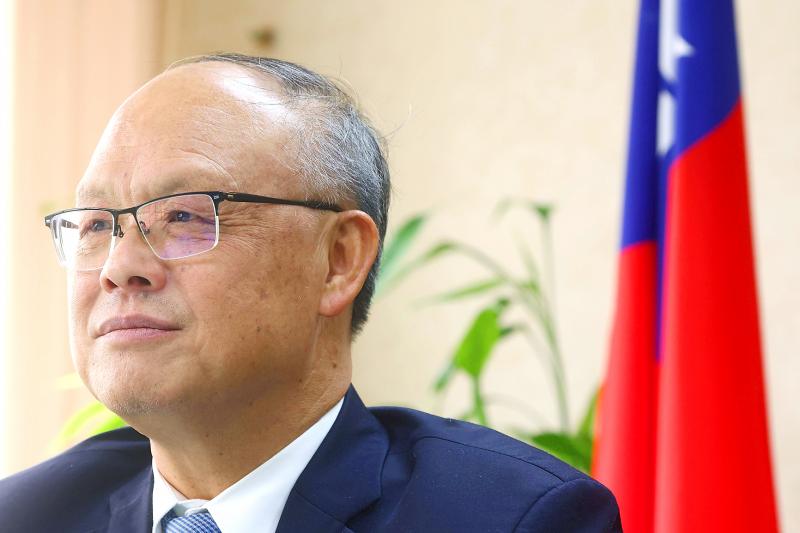Taiwan is under no illusions it can quickly sign a long-hoped-for free-trade deal with the US, but feels when the time is right “success will flow naturally,” the nation’s lead trade negotiator said yesterday.
Taiwan has long sought a bilateral trade deal with the US.
The government on Jan. 1 lifted a ban on imports of pork containing a leanness-enhancing additive, ractopamine, removing a major stumbling block to an agreement with Washington.

Photo: Ann Wang, Reuters
However, US President Joe Biden has only just assumed office, and his nominee for US secretary of the Treasury, Janet Yellen, told lawmakers this week they would prioritize domestic investment in workers and infrastructure before embarking on any new free-trade agreements.
Minister Without Portfolio John Deng (鄧振中), who leads trade talks, said that the government well knew that for the US to sign free-trade agreements with anyone was a major issue, especially with a new administration in office.
“We absolutely understand US politics and we do not have any unrealistic fantasies,” he said. “The new government has its priorities and of course we need to understand that.”
Deng said he was confident a deal would happen eventually, pointing to the pork decision and support for an agreement among US lawmakers.
“We have always thought that this is a matter of ‘when conditions are right, success will flow naturally,’” he said.
Trade-dependent Taiwan is also angling to join the revamped version of the Trans-Pacific Partnership, the 11-country Comprehensive and Progressive Agreement for Trans-Pacific Partnership (CPTPP), signed in 2018, without the US.
“This is a very high-priority project for us, but we also understand this involves lots of other countries, 11 of them, so we’re not willing to set a timetable or a target,” Deng said.
While Taiwan is a member of the WTO, many countries are wary of signing trade deals with the tech powerhouse fearing objections from China, although Taiwan does have free-trade deals with Singapore and New Zealand.
President Tsai Ing-wen (蔡英文) this week told Britain’s newly appointed de facto ambassador in Taipei that she hoped they could begin talks on a free-trade or bilateral investment agreement.
The UK has been looking for such deals since leaving the EU.
“There have been no negotiations, but the British side knows Taiwan’s interest,” Deng said, when asked about the chances of a deal with Britain.

A group of Taiwanese-American and Tibetan-American students at Harvard University on Saturday disrupted Chinese Ambassador to the US Xie Feng’s (謝鋒) speech at the school, accusing him of being responsible for numerous human rights violations. Four students — two Taiwanese Americans and two from Tibet — held up banners inside a conference hall where Xie was delivering a speech at the opening ceremony of the Harvard Kennedy School China Conference 2024. In a video clip provided by the Coalition of Students Resisting the CCP (Chinese Communist Party), Taiwanese-American Cosette Wu (吳亭樺) and Tibetan-American Tsering Yangchen are seen holding banners that together read:

UNAWARE: Many people sit for long hours every day and eat unhealthy foods, putting them at greater risk of developing one of the ‘three highs,’ an expert said More than 30 percent of adults aged 40 or older who underwent a government-funded health exam were unaware they had at least one of the “three highs” — high blood pressure, high blood lipids or high blood sugar, the Health Promotion Administration (HPA) said yesterday. Among adults aged 40 or older who said they did not have any of the “three highs” before taking the health exam, more than 30 percent were found to have at least one of them, Adult Preventive Health Examination Service data from 2022 showed. People with long-term medical conditions such as hypertension or diabetes usually do not

Heat advisories were in effect for nine administrative regions yesterday afternoon as warm southwesterly winds pushed temperatures above 38°C in parts of southern Taiwan, the Central Weather Administration (CWA) said. As of 3:30pm yesterday, Tainan’s Yujing District (玉井) had recorded the day’s highest temperature of 39.7°C, though the measurement will not be included in Taiwan’s official heat records since Yujing is an automatic rather than manually operated weather station, the CWA said. Highs recorded in other areas were 38.7°C in Kaohsiung’s Neimen District (內門), 38.2°C in Chiayi City and 38.1°C in Pingtung’s Sandimen Township (三地門), CWA data showed. The spell of scorching

POLICE INVESTIGATING: A man said he quit his job as a nurse at Taipei Tzu Chi Hospital as he had been ‘disgusted’ by the behavior of his colleagues A man yesterday morning wrote online that he had witnessed nurses taking photographs and touching anesthetized patients inappropriately in Taipei Tzu Chi Hospital’s operating theaters. The man surnamed Huang (黃) wrote on the Professional Technology Temple bulletin board that during his six-month stint as a nurse at the hospital, he had seen nurses taking pictures of patients, including of their private parts, after they were anesthetized. Some nurses had also touched patients inappropriately and children were among those photographed, he said. Huang said this “disgusted” him “so much” that “he felt the need to reveal these unethical acts in the operating theater